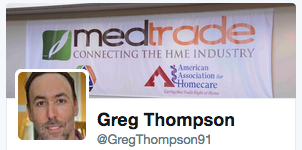AMARILLO, TX – After a dozen years running BritKare Home Medical, it’s safe to say that Josh Britten knows the challenges of competitive bidding. Started in 1994 by Josh’s father, the humble shop expanded to 65 employees with four locations in Texas—two in Amarillo, one in Lubbock, and one in Waco.
Josh recently purchased the business from his dad, and is now applying his business sense to an era that demands brutal efficiency. There was no “golden commode” era for the younger Britten, now 34. Instead, he has dealt with the low reimbursement rates for years, choosing to join the American Association for Homecare (AAHomecare) and fight for the industry on a variety of fronts.
As a member at large on the AAHomecare Board of Directors, Britten has seen the power of advocacy first hand. He sat down with Medtrade Monday to share a few of those victories in hopes that others can feel the motivation.
Greg Thompson, editor, Medtrade Monday: How much has competitive bidding affected the business?
Britten: The rates from competitive bidding have had a major effect on us. When I came back and started running BritKare 12 years ago to now, we’ve had to adapt just about every year if not every quarter, if not every day—such as changing insurance policies that can be directly related to competitive bidding. I’m sure there are other industries that have to reinvent a mouse trap every week, but ours seems to be one of the ones you have to be the most proactive about because it sure does change pretty quickly.
We’re in the rural area, so competitive bidding took a few years to actually hit us, but it’s been a steady decline for the industry. I read somewhere that 40 percent of DMEs since 2008 have gone out of business, or at least 45 percent have turned in their NPI number. There’s no advantage to turning in your NPI, so I’m thinking that a lot have gone out of business, maybe even higher than previous estimates.
Thompson: You never had a golden era of nice reimbursements, correct?
Britten: Correct, but in a strange way it might have been a great time to come into the industry because I think some providers were reluctant to change. Having a fresh outlook might have been beneficial.
Thompson: Why did you get involved on the advocacy side with AAHomecare?
Britten: I am on the Texas Medicaid Advisory Committee now as well, and I’m also the DME chair on that. That’s kind of why I decided to get involved.
 Thompson: What do you consider your best win on the advocacy side?
Thompson: What do you consider your best win on the advocacy side?
Britten: There was a Texas Medicaid MCO that was trying to go direct with a large distributor for the whole state of Texas. I was having a random lunch that our congressman was at. He and I weren’t even sitting at the same table. I walked over and presented him a sheet of paper showing what this Texas Medicaid MCO was trying to do to Texas, and especially the most critically ill in our state. He immediately asked for my cell phone number. I gave it to him and a week later I was testifying in front of Health and Human services in Austin, Texas, in the main congressional hearing, and presenting the DME case.
I didn’t give the congressman any money. I didn’t hire a lobbyist. I basically went and presented our case. That alone, along with a few other testimonies, but mainly my congressman and my testimony got that policy stopped. It was a big deal. Two companies were trying to basically cut out all the medical supplies that go to the sickest kids in Texas and do a direct deal which would have been horrible for those patients. They would have lost any choice if they were unhappy with what was going on. They would have lost any power they had. Anyway, one congressman from a small district in West Texas blocked two major publicly traded corporations, and it kind of made me realize how much one voice matters.
Thompson: What did you learn from the experience?
Britten: I was really impressed in our state’s ability to adapt and listen to providers. My main reason for getting involved is we’ve had the wrong narrative as an industry ever since 2008. We’ve always talked about competitive bid and the rates and how it’s going to hurt. We need to talk more about the patients, and how it hurts the patients. The fact that a lot of times now they’re reliant on a national DME that cannot provide the same services as a local independent or a regional independent. That’s kind of what I learned from that experience.
Thompson: What’s the best way to get legislators’ attention?
Britten: If you focus your energy toward the patient and give members of Congress and senators a visual of what exactly is going on inside the home, and how they actually save money through our industry, change can happen. But it’s going to take the visual. It’s going to take getting these patients in front of them. That’s harder to do than it sounds, but that’s kind of where change really happens.
Thompson: What have the last few months been like for your business?
Britten: We’ve had to increase costs with PPE. The cost of PPE in order to take care of the patients has increased significantly. Masks, gloves, gowns.
Thompson: What about the retail portion of your business?
Britten: Yes, we had a pretty robust retail clientele. People enjoyed coming and seeing us and buying things with cash as well. That has gone to nothing, because we are unable to open up our doors. We’re doing curbside setups on just about everything, which has worked. People are understanding. But I’ve always said this—no one comes to a DME if they’re not sick. We’re a need, not a want. No one ever has wanted to go look and shop for a bedside commode.
And so with that, we’re not able to open up our doors because we are a large respiratory provider and right now if you have a respiratory illness, in a lot of cases they’re not exactly for sure if it’s COVID or not. That test takes three to four days in a lot of cases, and unfortunately due to that, we haven’t been able to open our doors—so the retail side has suffered.
Our rehab and power wheelchair side has slowed down a little bit. In fact, it’s slowed down quite a bit. Sadly with us being a pediatric provider, many of our referrals are actually generated from school teachers. The school teacher is the one who first notices there’s something wrong. With children in Texas not being back to school since March, we have noticed that referrals have not been generated. I’m interested to see now that Texas is actually starting back, if it will catch back up. I’m 100 percent sure it will, but we have noticed that our retail and our complex rehab has slowed down significantly.
Thompson: How relevant are in-person trade shows at this point?
Britten: Trade shows are very valuable. Anything that’s in person has been more valuable to me. The networking has been more valuable to me than anything else. I learn from people who aren’t in my little bubble. BritKare, my company, would be considered a big fish in a small pond. Getting out and learning from other people who are in other networks, and being able to call about five to ten providers who I actually trust, has helped a ton. In person is the only way to really build those relationships. You can’t do it over the phone. You can’t do it over a virtual meeting. That’s the most important thing I think Medtrade brings to this industry. It’s bringing us together to have a common cause.
Thompson: What do you hope the pandemic has taught legislators about the industry?
Britten: We matter as an industry. It is telling that when the pandemic hit, the first thing CMS did was stop all audits and increase our Medicare rates in rural and non-rural areas. They’ve known they have a patient access-to-care issue, and it took a pandemic for them to admit it. But we do matter as an industry, and if there’s ever been a time for us to stand up and say we matter, it’s right now.
Thompson: Are you for delaying competitive bidding round 2021?
Britten: I agree with the delay, but I actually think we’re asking for too little. I think right now you have a respiratory pandemic on your hands. What happens December 31? Good Medicare providers come and pick up their equipment and say, ‘Sorry I lost my contract.’ Would that be an interesting story?
Thompson: What should providers be asking for?
Britten: We should be asking for 50/50 blended rates across the nation. It would bring back USA manufacturing here because if you really look at what our industry buys, about 75 to 85 percent of our stuff is made somewhere in either China or the Philippines. We’re not asking for enough. It’s obvious they know we’re needed. They wouldn’t have made such rapid changes immediately when it hit if they didn’t know we were needed.
Right now a delay to 2021 may actually come back to bite us in the butt. In 2021, you may have a vaccine out, and this pandemic might be done. Right now, we could put a face on competitive bidding. If we were ever going to have a fight against competitive bidding, my personal opinion is right now we are stronger than ever.
I’m the only one who thinks that way apparently because everyone wants it delayed. I think that’s short term. I think if you’re 65 and not planning on being in the business very long, you want to hold out for one more year, and that makes a lot of sense to delay it. If you’re 34 like me, and want to try to make a career out of this industry, you’re thinking long term.
Thompson: And what’s the long term plan?
Britten: Well we’ve got to have higher rates so we can bring back USA manufacturing which is a hot button topic right now. Ventilators are essential. They ought to be manufactured in the USA in case something like this ever happens again. I feel like right now there’s a light shined on respiratory health care. This is a fight with Medicare, with CMS. Competitive bidding is a fight. They are about to walk off a cliff. They are about to shut down a lot of good providers whenever they reissue these bids. My point is, let them walk off that cliff. Let them hit the ground. Then we can go back to Congress and say, ‘This is why you shouldn’t have done it.’



